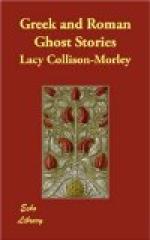“The learned Principal,” continues Burton, “whose courage and coolness deserve the highest commendation, lighted himself back to bed with the candles, and took the remainder of his rest undisturbed. Being a man of great sagacity, on ruminating over his adventure, he informed the Sheriff of the county ’that he was much of the mind there was murder in the case.’ The stone whereon the candles were placed was raised, and there ’the plain remains of a human body were found, and bones, to the conviction of all.’ It was supposed to be an old affair, however, and no traces could be got of the murderer. Rule undertook the functions of the detective, and pressed into the service the influence of his own profession. He preached a great sermon on the occasion, to which all the neighbouring people were summoned; and behold in the time of his sermon, an old man near eighty years was awakened, and fell a-weeping, and before the whole company acknowledged that at the building of that house, he was the murderer.”
The main features of the story have changed very little in the course of ages, except in the important point of the conviction of the murderer, which would have been effected in a very different way in a Greek story. Doubtless a similar tale could be found in the folk-lore of almost any nation.
Plutarch[32] relates how, in his native city of Chaeronaea, a certain Damon had been murdered in some baths. Ghosts continued to haunt the spot ever afterwards, and mysterious groans were heard, so that at last the doors were walled up. “And to this very day,” he continues, “those who live in the neighbourhood imagine that they see strange sights and are terrified with cries of sorrow.”
It is quite clear from Plautus that ghost stories, even if not taken very seriously, aroused a wide-spread interest in the average Roman of his day, just as they do in the average Briton of our own. They were doubtless discussed in a half-joking way. The apparitions were generally believed to frighten people, just as they are at present, though the well-authenticated stories of such occurrences would seem to show that genuine ghosts, or whatever one likes to call them, have the power of paralyzing fear.
In the Mostellaria,[33] Plautus uses a ghost as a recognized piece of supernatural machinery. The regulation father of Roman comedy has gone away on a journey, and in the meantime the son has, as usual, almost reached the end of his father’s fortune. The father comes back unexpectedly, and the son turns in despair to his faithful slave, Tranio, for help. Tranio is equal to the occasion, and undertakes to frighten the inconvenient parent away again. He gives an account of an apparition that has been seen, and has announced that it is the ghost of a stranger from over-seas, who has been dead for six years.
“Here must I dwell,” it had declared, “for the gods of the lower world will not receive me, seeing that I died before my time. My host murdered me, his guest, villain that he was, for the gold that I carried, and secretly buried me, without funeral rites, in this house. Be gone hence, therefore, for it is accursed and unholy ground.” This story is enough for the father. He takes the advice, and does not return till Tranio and his dutiful son are quite ready for him.




